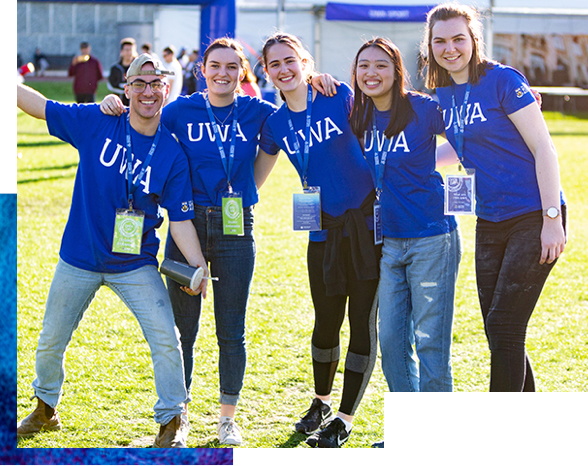Postgraduate
Graduate Certificate in Forensic Anthropology
Contact us
Address
Student Central
The University of Western Australia (M355), 35 Stirling Highway, Perth, Western Australia 6009
Telephone
131 UWA (131 892)
International
(+61 8) 6488 1000
Hours
Frequently asked questions
Events you may be interested in
Show more eventsCareers and further study
Explore the career opportunities available to you.
Career Pathways
As a graduate, you'll have a range of employment options. You could pursue a career as a forensic scientist in general, or an anthropologist specifically, in both public and private sectors. Opportunities might include working in forensic science industries, other science-based fields, teaching, or with government agencies, state and federal police, ASIO, correctional services, and community services. You could also consider freelancing as a forensic anthropologist or working with a private forensic company, a national institution, or even the United Nations.
Further Study
Students completing this degree may have the option to pursue further studies in research.
Fees and scholarships
Learn more about the fees that apply to you for this course.
Domestic Student Fees
For Full-Fee Paying places, students are charged an annual course fee, charged per credit point at a rate dependent on the course in which the student is enrolled. Annual course fees are calculated based on a standard annual study load of 48 credit points (1.0 EFTSL).
Check the handbook to confirm the annual study load for your course.
Visit the Fee Calculator and select your course type to find out more. Fees are subject to annual indexation.
More information on how fees are calculated.
Scholarships
Scholarships are available to students from a diverse range of backgrounds, including academic achievement, financial need, educational disadvantage, leadership and community service, artistic or sporting achievements, and being from a rural or remote area.
Cost of living
International Student Fees
There is no current fee information available for this course. Please visit the fee calculator to browse course fees from a previous year, or other courses.
Scholarships
Scholarships are available to students from a diverse range of backgrounds, including academic achievement, financial need, educational disadvantage, leadership and community service, artistic or sporting achievements, and being from a rural or remote area.
Cost of living
Admission requirements
If you’re interested in furthering your career by studying this postgraduate course, find out the admission details below
Admission Requirements
(a) a Bachelor's degree, or an equivalent qualification, as recognised by UWA;
and
(b) the equivalent of a UWA weighted average mark of at least 50 per cent.
Ranking and Selection Process
English competency
English is the language of instruction and assessment at UWA and you will need to meet the English language requirements of the University to be eligible for a place.
Minimum overall IELTS score of 6.5, with no band less than 6.0.
How to apply

Ready for the next step?
Find out how to apply through our simple online application process.
We'll guide you through our entry requirements, admission pathways available to you and application deadlines for your chosen course.
We can’t wait for you to join us!
Course details
About the course
Quick details
- Available
- Perth (Crawley campus)
- Full-time
- Part-time
- On-campus
- Semester 1, Semester 2
- 8-12 hours
- Postgraduate
- 72280
- 093805D
Course structure
Postgraduate coursework degrees and combined (coursework and research) degrees comprise a number of units. Refer to the course structure for more information.
Why study this course?
- Students will develop an in-depth knowledge of the human skeleton
- Participants will gain a practical understanding of the scientist’s role within the Australian legal system including ethics and research methods in the forensic sciences
- Students can tailor their educational experience through selection of two core and two optional units (such as medico-legal death investigation, forensic archaeology, and scientific expert testimony)
You'll learn to
- become familiar with the human skeleton using real bone specimens
- have the skills to undertake a biological profile of human skeletal and dental remains
- become familiar with sciences aligned to forensic anthropology
Work Integrated Learning
Staff within the Centre for Forensic Anthropology have industry experience, contacts and participate in fieldwork on occasion. Students are often invited to participate in any relevant opportunities that arise.
Articulated courses
This course is part of an articulated sequence with the:
The Centre for Forensic Anthropology
The Centre for Forensic Anthropology is committed to the development of a new generation of morphometric tools and standards for application in forensic identification in Western Australia. A requirement in routine casework involving unidentified skeletal remains is the formulation of an accurate biological profile.
Choice of method is invariably related to skeletal preservation and by association the bones available. It is vital however that the method applied affords statistical quantification of accuracy rates and predictive confidence, so that evidentiary requirements for legal submission are met. Achieving the latter requires the application of contemporary population-specific standards.
Our research group is working towards developing these standards through the integration of morphological computer-based (geometric morphometric) analytical approaches and multivariate isotopic and elemental chemical methods for the identification of unknown human remains. The Anthropology research group is keen to develop a ‘Human Identification Package’ (HIP) for specific application within forensic casework and Disaster Victim Identification (DVI).
The group welcomes international and interdisciplinary collaborations of value to the fields of Forensic Anthropology and Archaeology. Follow us on Facebook.

